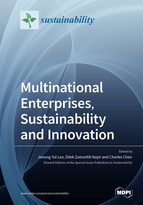Multinational Enterprises, Sustainability and Innovation
A special issue of Sustainability (ISSN 2071-1050). This special issue belongs to the section "Economic and Business Aspects of Sustainability".
Deadline for manuscript submissions: closed (31 October 2022) | Viewed by 33491
Special Issue Editors
Interests: international business; emerging market MNEs; MNE innovation; corporate social responsibility; business ethics
Special Issues, Collections and Topics in MDPI journals
Interests: international business/management; entrereneurship and small business management, emerging market MNEs; business ethics
Special Issue Information
Dear Colleagues,
Multinational enterprises (MNEs) have undertaken foreign direct investments across the globe, so they have to face diverse and differential sustainability agendas since they have to deal with homogeneous and heterogeneous sustainability issues and policies from both home and host countries. In this vein, MNEs need to find better ways of sustainable development and innovation-based solutions in both sides of home and host countries. Furthermore, there have been a rapidly increasing number of studies on sustainable international business and innovative practices by MNEs in developed markets, providing shareholder values, environmental agendas, and managing macroeconomic instability. There has even been a stream of literature on sustainability-oriented innovation relating to both the environmental as well as social aspects of sustainability. Of these two, especially the environmental aspect has been driven by market demand for cleaner products and increasing environmental regulations and cost savings. Nevertheless, unfortunately, there has been lack of studies on sustainable international business and innovative practices by MNEs in emerging and frontier markets, although Brazil, Russia, India, China, and South Africa (BRICS) have obviously progressed in terms of sustainable development and innovation-based solutions from the MNEs in and out of their home countries. Additionally, innovation has assumed a rather different form in the case of emerging market MNEs (EMNEs). As research and development possibilities are limited, learning by doing and using and organizational capabilities have a greater weight in EMNEs. The innovation of these firms is scientifically less refined than those of developed countries and has not generally involved frontier technologies. The different type of innovation pursued by EMNEs, especially considering sustainability issues, thus requires a deeper investigation that looks at technology creation more broadly than the sphere of research and patenting activity. Thus, the goal of this Special Issue is to overcome the limitations of existing studies, which have mostly focused on developed markets, and to expand our relevant themes to international business sustainability and innovative solutions by emerging and frontier market MNEs.
We invite both conceptual and (qualitative and quantitative) empirical articles, as well as literature review and meta-analysis articles from various fields, including not only business and management but also sociology, political science, psychology, economics, economic geography, and so on. Examples of relevant topics include but are not limited to:
- How do EMNEs shape sustainable development and related innovations in home and host countries through sustainability and innovative solutions? What are their similarities and/or differences from advanced market MNEs?
- What are the challenges versus opportunities of these EMNEs to deal with the unique political, cultural, religious, and commercial environments in their home and host countries for achieving their sustainability and innovation goals?
- What are the repercussions for the contextual effects on these EMNEs’ sustainability and innovative solutions, especially for country of origin and domicile pressures in home and host countries?
- How do recent environmental disruptions, such as the global financial crisis in 2008 and the current COVID-19 pandemic crisis, affect sustainable international business practices and innovative solutions based on corporate social and environmental responsibility in emerging and advanced markets?
- How do developed versus emerging/frontier market MNEs enhance their sustainability and innovation based on their human resources, transnational, or virtual teams when they face the challenges for the enhancement of their sustainability and innovative solutions?
- Can high-level internationalization of EMNEs lead to superior corporate sustainability, which encompasses various social issues such as stakeholder wellbeing and environmental protection?
- The legal guarantee for the sustainable development of green economy;
- MNEs, political stability, and the risk of emerging capital markets;
- Foreign executives, R&D innovation, and corporate social responsibility;
- Green innovation efficiency;
- Path innovation of labor security of flexible employment.
Prof. Dr. Jeoung Yul Lee
Prof. Dr. Dilek Zamantili Nayir
Prof. Dr. Charles Chen
Guest Editors
Manuscript Submission Information
Manuscripts should be submitted online at www.mdpi.com by registering and logging in to this website. Once you are registered, click here to go to the submission form. Manuscripts can be submitted until the deadline. All submissions that pass pre-check are peer-reviewed. Accepted papers will be published continuously in the journal (as soon as accepted) and will be listed together on the special issue website. Research articles, review articles as well as short communications are invited. For planned papers, a title and short abstract (about 100 words) can be sent to the Editorial Office for announcement on this website.
Submitted manuscripts should not have been published previously, nor be under consideration for publication elsewhere (except conference proceedings papers). All manuscripts are thoroughly refereed through a single-blind peer-review process. A guide for authors and other relevant information for submission of manuscripts is available on the Instructions for Authors page. Sustainability is an international peer-reviewed open access semimonthly journal published by MDPI.
Please visit the Instructions for Authors page before submitting a manuscript. The Article Processing Charge (APC) for publication in this open access journal is 2400 CHF (Swiss Francs). Submitted papers should be well formatted and use good English. Authors may use MDPI's English editing service prior to publication or during author revisions.
Keywords
- multinational enterprise
- foreign direct investment
- sustainability
- innovation
- sustainable innovation
- sustainable international business practices
- corporate social and environmental responsibility
- human resources
- emerging and frontier markets
- advanced markets/countries








